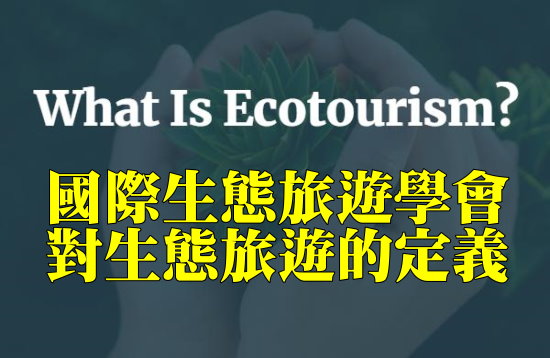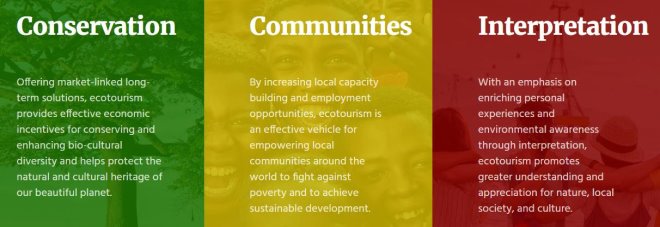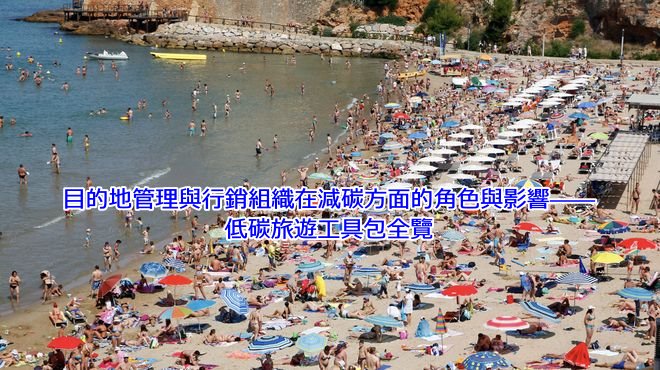
生態旅遊(Ecotourism)源自1965年美國柏克萊加利福尼亞大學學者Nicholas Hetzer在Links雜誌中批評觀光活動在發展中國家所造成的衝擊,用了「ecological tourism」及「Eco-Tourism」這二個字詞,不過當初Hetzer只提出四個原則,並沒有直接對生態旅遊提出定義。超過半世紀,全世界學者或機構對生態旅遊下了各種大同小異的定義,不過最多被引用的,可能是國際生態旅遊學會(The International Ecotourism Society, TIES)下的定義。
隨著時代變遷,實務成熟,以及愈來愈多的論述,國際生態旅遊學會在2015年對生態旅遊下了新的定義,只是很多人不察,甚至連進入TIES網站查證一下都沒有,每每在論文或報告引用的還是1990年的舊定義。為了讓生態旅遊資訊保持正確,我特地將國際生態旅遊學會在2015年對生態旅遊的新定義張貼在此,希望以後看到引用的資料是新的、正確的。
先看該學會在1990年對生態旅遊下的舊定義:
生態旅遊是在自然地區負責任的旅行,顧及環境保育並促進地方居民的福祉。
Responsible travel to natural areas that conserves the environment and improves the well-being of local people.

再看該學會在2015年對生態旅遊下的新定義:
生態旅遊是在自然地區負責任的旅行,顧及環境保育,維續地方居民的福祉,並要有解說及對業者與遊客教育的內涵。
Responsible travel to natural areas that conserves the environment, sustains the well-being of the local people, and involves interpretation and education” (TIES, 2015). Education is meant to be inclusive of both staff and guests.

底下是TIES對生態旅遊內涵的論述,我也翻譯給大家參考:
保育
生態旅遊提供與市場鏈結的長期解決方案,為保護和增強生物文化多樣性提供有效的經濟誘因,並有助於保護我們美麗星球的自然和文化遺產。
Conservation
Offering market-linked long-term solutions, ecotourism provides effective economic incentives for conserving and enhancing bio-cultural diversity and helps protect the natural and cultural heritage of our beautiful planet.
社區
透過增進對當地的培力和就業機會,生態旅遊是增能世界各地社區脫貧並實現永續發展的有效工具。
Communities
By increasing local capacity building and employment opportunities, ecotourism is an effective vehicle for empowering local communities around the world to fight against poverty and to achieve sustainable development.
解說
生態旅遊強調通過解說來豐富個人體驗和環境意識,從而促進人們對自然、當地社會和文化的了解與欣賞。
Interpretation
With an emphasis on enriching personal experiences and environmental awareness through interpretation, ecotourism promotes greater understanding and appreciation for nature, local society, and culture.

底下是TIES對生態旅遊原則的論述,我也翻譯給大家參考:
生態旅遊原則 Principles of Ecotourism
生態旅遊整合了生態保育、社區和永續旅行。 這意味著那些施行、參與和銷售生態旅遊活動的人應該採取以下的生態旅遊原則:
- 對身體、社會、行為和心理的影響降到最小。
- 建立環境和文化意識並尊重。
- 提供遊客和接待者正面的經驗。
- 為生態保育提供直接的經濟利益。
- 為在地居民和民營企業帶來經濟利益。
- 提供遊客難忘的解說體驗,有助於提高對接待社區政治、環境和社會氛圍的感受。
- 設計、建造和運營低衝擊的設施。
- 認同您社區中原住民的權利和精神信仰,並與他們合作增能。
Ecotourism is about uniting conservation, communities, and sustainable travel. This means that those who implement, participate in and market ecotourism activities should adopt the following ecotourism principles:
- Minimize physical, social, behavioral, and psychological impacts.
- Build environmental and cultural awareness and respect.
- Provide positive experiences for both visitors and hosts.
- Provide direct financial benefits for conservation.
- Generate financial benefits for both local people and private industry.
- Deliver memorable interpretative experiences to visitors that help raise sensitivity to host countries’ political, environmental, and social climates.
- Design, construct and operate low-impact facilities.
- Recognize the rights and spiritual beliefs of the Indigenous People in your community and work in partnership with them to create empowerment.
期待以後看到的論文、報告、報導、文章引用國際生態旅遊學會的生態旅遊定義都是2015年的。
延伸閱讀:
韓國生態旅遊標準 Korean Ecotourism Standard 中英對照
世界自然保育聯盟世界保育大會決議強化生態旅遊標準(中英對照)
本網誌「生態旅遊或觀光遊憩」專欄各文








感謝賴老師分享。
賴鵬智老師長期投入並實際參與生態旅遊, 其網頁分享值得從事生態旅遊各路好漢們深入瞭解, 並在自己所肩負的角色上擇善施行並時刻提醒自己在消費生態之餘是否也能”淡薄ㄚ(台語)”回饋生態些甚麼, 共勉之!!